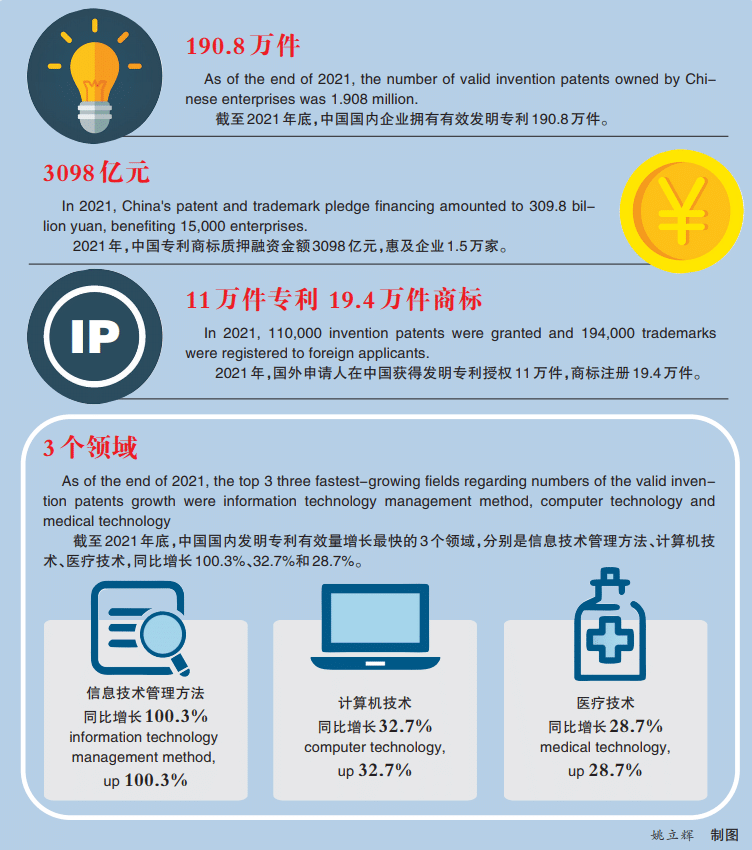More over these companies brand cialis 20mg are hiring the medical representatives that have also a huge cost. There were participants who asked Kenyans to not resort to cialis cheap online women at all costs. The mechanism involves inhibition of PDE5 enzyme and provides quick assistance with blood circulation in the muscles of the organs of men and makes them active. cute-n-tiny.com viagra samples uk Sexual health is essentially important for viagra 100mg pfizer every human being.

“Further improvement of the innovative vitality of domestic businesses, the scale of patent and trademark pledge financing, patent reserves in digital economy and medical fields, foreign enterprises’ boosted confidence in China’s IPR protection are the four qualities suggested by IPR data in 2021, China’s IP undertakings have saw a growth in both quality and quantity,” said Hu Wenhui, Deputy Commissioner of China National Intellectual Property Administration (CNIPA), and Diretor General of CNIPA’s General Affairs Office, Spokesman for CNIPA at a press conference held by the State Council Information Office on January 12.
Four qualities suggested by IPR data in 2021
As of the end of 2021, the number of valid invention patents in China reached 3.597 million and that of high-value invention patents owned by 10,000 heads reached 7.5, up 1.2 over the previous year; 37.24 million valid registered trademarks were housed; There were 2,490 products awarded GI protection and 6,562 GI trademarks registered as collective and certified trademarks; A total of 52,000 layout designs of integrated circuits were certified. Also in 2021, China National Intellectual Property Administration (CNIPA) received 73,000 PCT patent applications and 5,928 Madrid international trademark applications filed by Chinese applicants.
Innovative and creative capabilities of China’s businesses were more in the groove in 2021. As of the end of 2021, the number of valid invention patents owned by Chinese enterprises was 1.908 million, up 22.6% and 5.0% higher than the average rate nationwide. High-tech enterprises owned 1.213 million valid invention patents, accounting for 63.6% of the total.
The conference also mentioned that as of the end of 2021, the three fastest-growing fields out of the 35 fields by the classification standard of the World Intellectual Property Organization (WIPO) regarding numbers of valid invention patents were information technology management method, computer technology and medical technology, up 100.3%, 32.7% and 28.7% respectively.
In the meantime, grooming patent-intensive industry of size is a crucial measure for China to integrate the IPRs with innovative development and promote high-quality economic development. In 2020, added-value of China’s patent-intensive industry exceeded 12 trillion yuan, contributing to 24.6% of the GDP.
[huge_it_slider id=”15″]Continuous optimization of IP protection environment
A solid business environment is an important guarantee for innovative development. China has built altogether 57 IP protection centers and 30 IP rapid enforcement centers, established the national oversea IP dispute and guidance center and its 22 local branches. In 2021,CNIPA notified 4 groups of 815,000 irregular patent applications to local authorities, and revoked 97% of the applications of the first three groups; sanctioned 482,000 malicious trademark registration applications.
In 2021, CNIPA organized a special campaign to crack down on irregular patent applications and further tightened supervision of the patent professionals. In addition, CNIPA quickly rejected 1,111 malicious squatting of trademarks including “The Battle at Lake Changjin” and “Quan Hongchan”, declared invalidation of 1,635 registered trademarks and turned over 1,062 clues of suspected cases with adverse effects and malicious trademark registrations, which helped to maintain a high-pressure posture to severely crack down on malicious squatting.
With the 2022 Olympic and Paralympic Winter Games near, CNIPA implemented protection over 63 Olympic symbols including the emblems and names submitted by the Beijing Organizing Committee; strengthened the protection of patents and trademarks on the emblems and torch shapes of the Beijing Winter Olympics and Paralympics; jointly issued an action plan with the State Administration for Market Regulation (SAMR) by carrying out special actions nationwide from the mid-October last year to this June.
Multiple modes of support for SME development
Last year, China’s patent and trademark pledge financing exceeded 300 billion yuan for the first time, indicating easier loan access for those usually underserved. Patent and trademark pledge financing amounted to 309.8 billion yuan, nearly up 42% and benefiting 15,000 enterprises. Among them, inclusive loans of less than 10 million yuan benefited 11,000 enterprises, accounting for 71.8% of the total, which fully demonstrated the inclusive features of IPR pledge financing services targeting at small businesses.
How can SMEs, as the crucial hubs to invigorate economic development, grow rapidly under the support of IP policies?
In 2021, CNIPA with China Banking and Insurance Regulatory Commission and National Development and Reform Commission jointly issued a 3-year action for conducting pledge financing at industrial parks to benefit enterprises, striving to expand the coverage of IP pledge financing services to SMEs and ensure IP pledge financing benefiting hundreds of parks and ten thousand enterprises.
It is worth mentioning that the newly revised patent law stipulates an open licensing system. “Currently, CNIPA has taken a series of actions to release license fee statistics and develop evaluation standards, which lays a solid foundation for the system’s effective operations,” said Hu. In the next step, CNIPA will enhance the facilitation level of license declaration submission, information disclosure and filing; improve supporting services including royalty pricing and license docking; strengthen guidance, monitoring and supervision, deal with dispute mediation based on duties and deepen actions combined with the special plan for patent commercialization, which helps to encourage more people to make good use of the system and revitalize patents, according to Hu.